Brief Papers
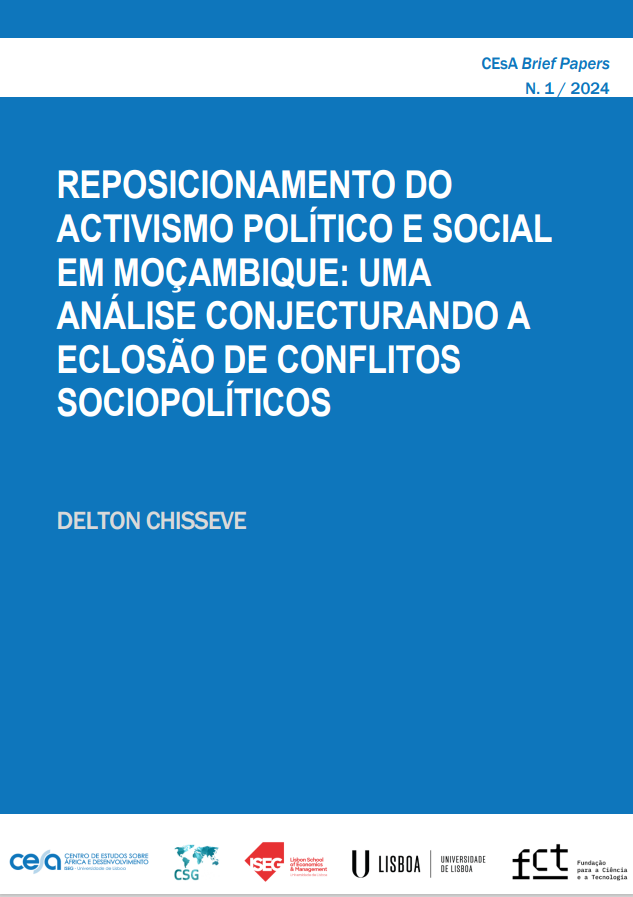
Brief Paper 1/2024: Reposicionamento do activismo político e social em Moçambique: Uma análise conjecturando a eclosão de conflitos sociopolíticos
Abstract:
This Brief Paper discusses the repositioning of political and social activism in Mozambique within a context heavily characterised by the active participation of citizens in the 2023 elections, a stark contrast to previous elections, which were largely marked by weak political and social activism. In this context, the Brief Paper argues that this repositioning is linked to the fact that the Mozambican population has acquired a new political and social awareness, marked by a quest for truth and authenticity in their leaders. This repositioning also reflects the population’s readiness to confront state power and entails two domains of analysis with harmful consequences for the Mozambican government: the domestic domain and the external domain. This occurs because the population increasingly shows a diminished fear of repression carried out by the police and military. Moreover, this repositioning has highlighted the existence of a latent and ongoing conflict between the current Mozambican government and the 1990–2000 generation. Methodologically, two tools supported this analysis: bibliographical techniques and documentary analysis. Theoretically, the Brief Paper is grounded in Maslow’s Basic Needs Theory, combined with the Frustration-Aggression Theory from conflict studies. Finally, the conjectures presented in this Brief Paper suggest that the current Frelimo government has lost legitimacy in the eyes of the people, particularly among the 1990–2000 generation. However, there are also conjectures based on the assumption that Frelimo retains legitimacy through two analytical perspectives: a traditional perspective and an institutional perspective. These two perspectives complement each other and justify Frelimo’s continued hold on power.
Cite this Brief Paper:
Chisseve, Delton (2024). “Reposicionamento do activismo político e social em Moçambique : uma análise conjecturando a eclosão de conflitos sociopolíticos”. CEsA/CGS – Brief Papers nº 1/2024
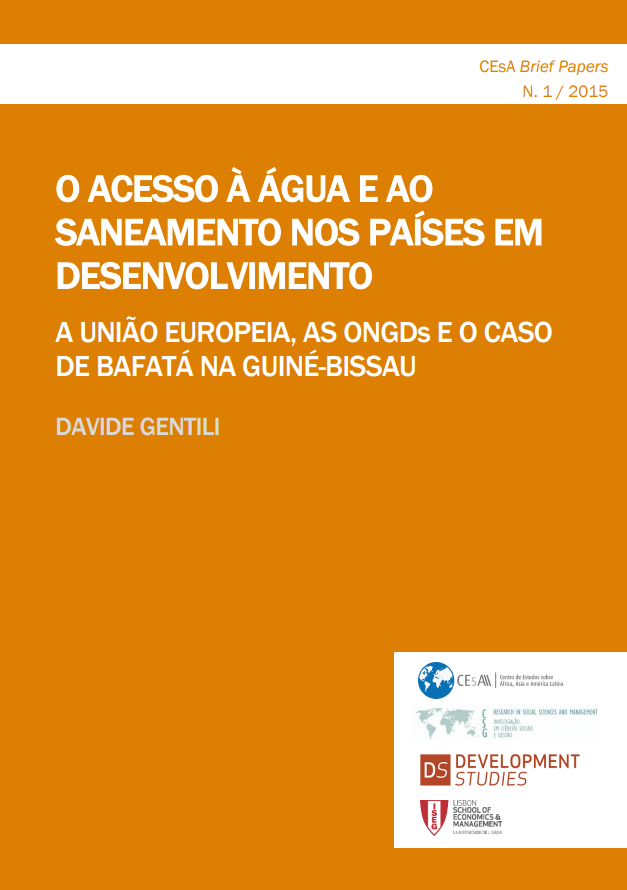
Brief Paper 1/2015: O Acesso à Água e ao Saneamento nos Países em Desenvolvimento: a União Europeia, as ONGDs e o caso de Bafatá na Guiné-Bissau
Abstract:
O acesso à água e ao saneamento nos países em desenvolvimento : a União Europeia, as ONGDs e o caso de Bafatá na Guiné-Bissau is born from the readaptation of the master’s thesis “Access to water and sanitation in developing countries: the European Union, NGDOs and the case of Bafatá in Guinea Bissau” carried out during 2014 and defended in November of the same year. The work is part of the theme of international cooperation with Developing Countries (DP) in the sector of water, sanitation and hygiene (WASH)3 and aims to investigate how good practices, agreed by international donors, for access to water and sanitation, influence the work of NGDOs operating in this sector. Thus, we sought to analyze how the European Union (EU), the most important donor in the WASH sector at an international level, has influenced the work in the WASH sector of the Portuguese NGDO – TESE – Associação para o Desenvolvimento. We tried to observe how TESE interprets the EU guidelines in the WASH sector, trying to understand if there is a blind adaptation to the guidelines in order to capture the funds, or if, on the contrary, there is a vision that guides the actions of TESE independently the availability of funding. In the first decade of the 2000s, the EU has strengthened its commitment to the WASH sector, funding numerous cooperation projects and actively contributing to the international political debate. Among the criteria that led to the choice of TESE, in addition to its geographical proximity and the opportunity to collaborate with the organization’s members, is the fact that it is one of the few NGDOs in Portugal committed to cooperation in the WASH sector in the Portuguese-speaking space. This, over the last decade, has established itself as a reference organization in the panorama of Portuguese NGDOs, being involved in several projects in the water and sanitation sector. Since its birth until today, there has been a substantial evolution of the organization, which now has a stable structure and well-defined objectives. Over time, TESE defined an intervention model specific to the organization. Among the projects carried out, one stands out, Bafatá Misti Iagu (BMI), co-financed by the EU in Bafatá, Guinea Bissau (GB). This will be the object of analysis as a case study. Between February and May 2014, the daily work of the TESE headquarters in Lisbon was monitored. Documents guiding EU cooperation and funding lines in the WASH sector were analyzed and compared with the results of the case study on Bafatá, writing the intervention context of the BMI project. from the analysis of documents of the projects carried out by TESE, from the evaluations of the projects and from the interviews carried out with current and previous members of the NGDO5. The comparison was mainly focused on: (1) the desired objectives, the target groups, the proposed actions and the approach promoted in the actions; (2) the approach to the key issues of access and management of water services. Here, we sought to compare the principles inherent to institutional and management issues (What is the resource management model that is promoted?), social and economic (What is the value attributed to water, in equity, in human rights, in gender equity? , in the quality of services promoted, and in questions of ownership, price, pricing of services?), and finally environmental, information, education, communication and technology6. This analysis resulted in a substantial approximation between the EU guidelines and the projects carried out by TESE. This result becomes more interesting considering that the line of financing with which TESE financed the BMI project in 2009 did not include specific guidelines on the water sector and the definition of objectives, expected results, activities and more in general. approach and is not subject to EC eligibility criteria in the WASH sector. Regarding the desired objectives, target groups, proposed actions and the approach promoted in the actions, there is a high correspondence of vision. TESE’s actions encompass both an infrastructural component (construction and rehabilitation of infrastructure, implementation of pollution prevention and water protection measures), and measures aimed at improving resource management in order to guarantee the durability of the intervention (awareness of the correct use of resources and education for hygiene, strengthening and management of institutions in the water sector). Among the measures shared by the EU and TESE aimed at resource management is the demand management, which, however, was not applied indiscriminately in the projects carried out by TESE, and each time there was a prior identification of the context and the your needs. The affinity of vision between EC and TESE remains constant, albeit with some difference, looking at the key access and management principles applied in the implementation of the BMI project (See Table A). This did not come about through the opening of a line of financing, but through the identification of the needs and opportunities for cooperation in Bafatá, in a perspective of complementarity and integration with other ongoing initiatives. The expected results were not defined to meet the eligibility conditions of the Call for Proposal -CfP-, but to have the best impact from the point of view of economic, human and environmental sustainability. The definition of these results derives from TESE’s own intervention pattern, which may change according to the context and requirements of the financing lines, but which in substance is not changed. Through the analysis of the projects carried out by TESE, it was possible to identify an intervention model of the organization. This model, the common thread between the projects, is an integral part of its cooperation strategy. Taking into account what has been observed, it can be said that TESE has a vision that guides its actions in the WASH sector, not limiting itself to applying ipsis verbis what is required in the EC CfPs. However, as we have seen, there is a good match between the objectives and good practices approved by the EC and the vision and work of TESE. Comparing the objectives, principles and proposed actions, it can be deduced that, taking as an example the application of the demand management principle, there is no implementation of internationally recognized good practices without a prior analysis of the intervention context.
Quotation:
Gentili, Davide (2015). “O acesso à água e ao saneamento nos países em desenvolvimento : a União Europeia, as ONGDs e o caso de Bafatá na Guiné-Bissau”. Instituto Superior de Economia e Gestão – CEsA Brief papers nº 1-2015.
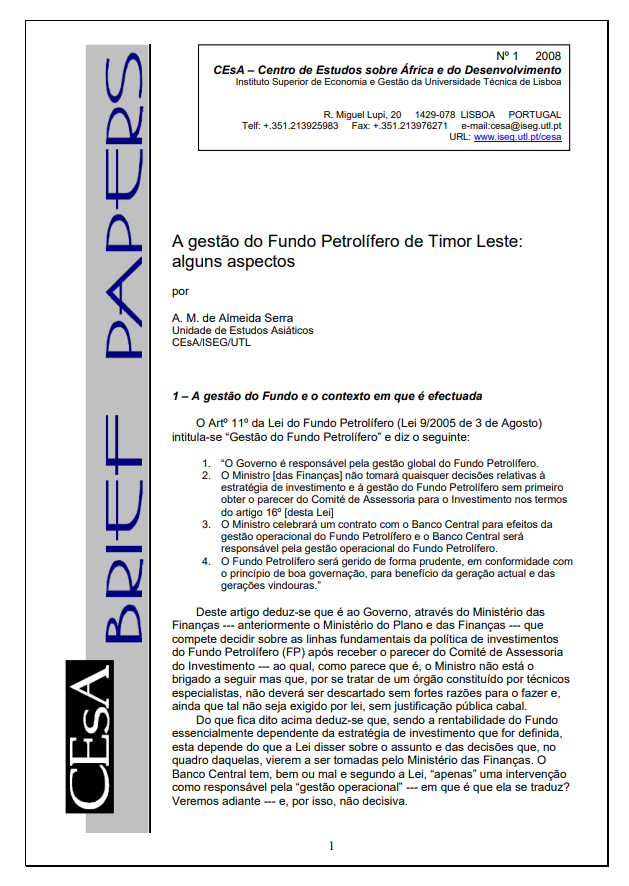
Brief Paper 1/2008: A Gestão do Fundo Petrolífero de Timor Leste: Alguns aspectos
Abstract:
The Article 11 of the Petroleum Fund Law (Law 9/2005 of 3 August) deduces that the Government, through the Ministry of Finance – formerly the Ministry of Planning and Finance – is responsible for deciding on the fundamental lines of the investment policy of the Petroleum Fund (PF) after receiving the opinion of the Investment Advisory Committee – to which, as it appears to be, the Minister is not bound to follow, but since it is a body made up of technical experts, it should not be dismissed without strong reasons to do so, and even if this is not required by law, without full public justification. As indicated by the characteristics of the series of CEsA texts in which it is published – its Brief Papers – A gestão do fundo petrolífero de Timor Leste: alguns aspectos should be understood as corresponding to a (little more than) initial phase of research on the topic we have proposed to study. Therefore, its conclusions – if we can speak of true conclusions or even lessons – are merely provisional and subject to some modification as a result of the continued research we have been doing on the subject. For this reason, and as much or more than in other circumstances, an appeal to the reader to let us know his opinions on what has been written, including possible inaccuracies in the approach to the subject, makes sense.
Quotation:
Serra, António M. de Almeida. 2008. “A gestão do fundo petrolífero de Timor Leste: alguns aspectos”. Instituto Superior de Economia e Gestão – CEsA Brief papers nº 1-2008.
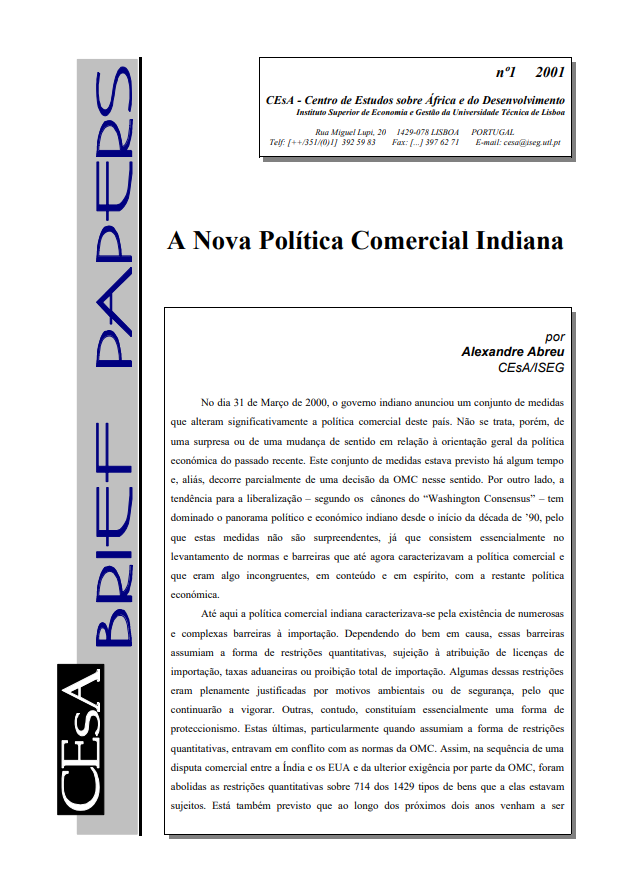
Brief Paper 1/2001: A Nova Política Comercial Indiana
Abstract:
On 31 March 2000, the Indian government announced a set of measures that significantly alter this country’s trade policy, studied in A nova política comercial indiana (The New Indian Trade Policy). This is not, however, a surprise or a change of direction in relation to the general orientation of the economic policy of the recent past. This set of measures was foreseen some time ago and, moreover, partly stems from a WTO decision to that effect. On the other hand, the trend towards liberalisation – along the lines of the “Washington Consensus” – has dominated the Indian economic and political landscape since the early 1990s. Hitherto Indian trade policy was characterised by the existence of numerous and complex import barriers. Depending on the good concerned, these barriers took the form of quantitative restrictions, import licensing, tariffs or a complete ban on imports. Some of these restrictions were fully justified on environmental or safety grounds and will therefore remain in place. Others, however, were essentially a form of protectionism. The latter, particularly when they took the form of quantitative restrictions, conflicted with WTO rules. Thus, following a trade dispute between India and the US and subsequent WTO demand, quantitative restrictions on 714 of the 1429 types of goods that were subject to them were abolished. It is also expected that over the next two years many of the remaining restrictions will be removed or reduced, in particular all quantitative restrictions – with the exception, as already mentioned, of those for environmental or safety reasons – and a substantial part of customs duties.
Quotation:
Abreu, Alexandre. 2001. “A nova política comercial indiana”. Instituto Superior de Economia e Gestão – CEsA Brief papers nº 1-2001.
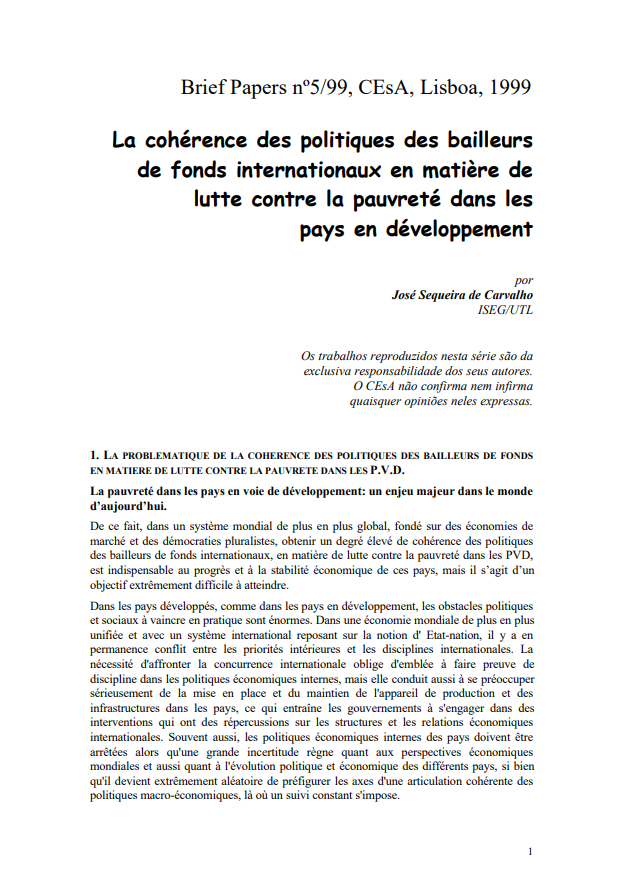
Brief Paper 5/1999: La Cohérence des Politiques des Bailleurs de Fonds Internationaux en Matière de Lutte Contre la Pauvreté dans les Pays en Développement
Abstract:
Poverty in developing countries is a major challenge in today’s world. In La cohérence des politiques des bailleurs de fonds internationaux en matière de lutte contre la pauvreté dans les pays en développement, we explore how in an increasingly global system based on market economies and pluralistic democracies, achieving a high degree of policy coherence among international donors in the fight against poverty in developing countries is essential for the progress and economic stability of these countries, but is an extremely difficult objective to achieve. In both developed and developing countries, the political and social obstacles to be overcome in practice are enormous. In an increasingly unified global economy and with an international system based on the nation-state, there is a constant conflict between domestic priorities and international disciplines. The need to compete internationally requires discipline in domestic economic policies from the outset, but also leads to serious concerns about building and maintaining the productive apparatus and infrastructure within countries, which leads governments to engage in actions that affect international economic structures and relations. In many cases, domestic economic policies have to be decided in the face of great uncertainty about the global economic outlook and political and economic developments in individual countries, making it extremely difficult to predict the direction of coherent macroeconomic policies, where constant monitoring is required.
Quotation:
Carvalho, José Sequeira de. 1999. “La cohérence des politiques des bailleurs de fonds internationaux en matière de lutte contre la pauvreté dans les pays en développement”. Instituto Superior de Economia e Gestão – CEsA Brief papers nº 5-1999.
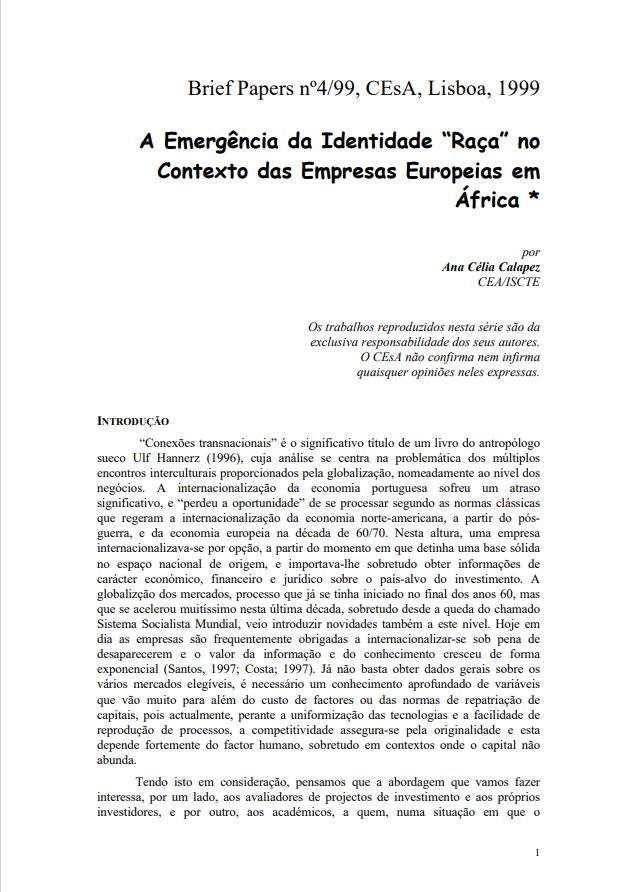
Brief Paper 4/1999: A emergência da identidade “Raça” no contexto das empresas europeias em África
Abstract:
Transnational Connections” is the significant title of a book by the Swedish anthropologist Ulf Hannerz (1996), whose analysis focuses on the problem of the multiple intercultural encounters which globalisation provides, namely at the business level. The internationalisation of the Portuguese economy suffered a significant delay and “missed the opportunity” to follow the classic rules which governed the internationalisation of the North American economy, from the post-war period, and of the European economy in the 60s and 70s. At that time, a company internationalised by choice, as soon as it had a solid base in its home country, and it was mainly important for it to obtain economic, financial and legal information on the target investment country. The globalisation of markets, a process that had already begun at the end of the 1960s, but which has greatly accelerated in the last decade, especially since the fall of the so-called World Socialist System, has also introduced innovations at this level. Nowadays, companies are often obliged to internationalise themselves or risk disappearing and the value of information and knowledge has grown exponentially (Santos, 1997; Costa; 1997). It is no longer enough to obtain general data on the various eligible markets, it is necessary to have in-depth knowledge of variables that go far beyond the cost of factors or the rules of repatriation of capital, because today, in the face of the standardisation of technologies and the ease of reproduction of processes, competitiveness is ensured by originality and this depends heavily on the human factor, especially in contexts where capital is not abundant. A emergência da identidade “Raça” no contexto das empresas europeias em África (The emergence of the “Race” identity in the context of European companies in Africa) was prepared for a paper on race at the CEsA 1999 Seminar: The problematic of development – history and current contributions from a transdisciplinary perspective, Conference on Strategic Identities for Development in Sub-Saharan Africa: gender and race, 23rd June 1999.
Quotation:
Calapez, Ana Célia. 1999. “A emergência da identidade “Raça” no contexto das empresas europeias em África”. Instituto Superior de Economia e Gestão – CEsA Brief papers nº 4-1999
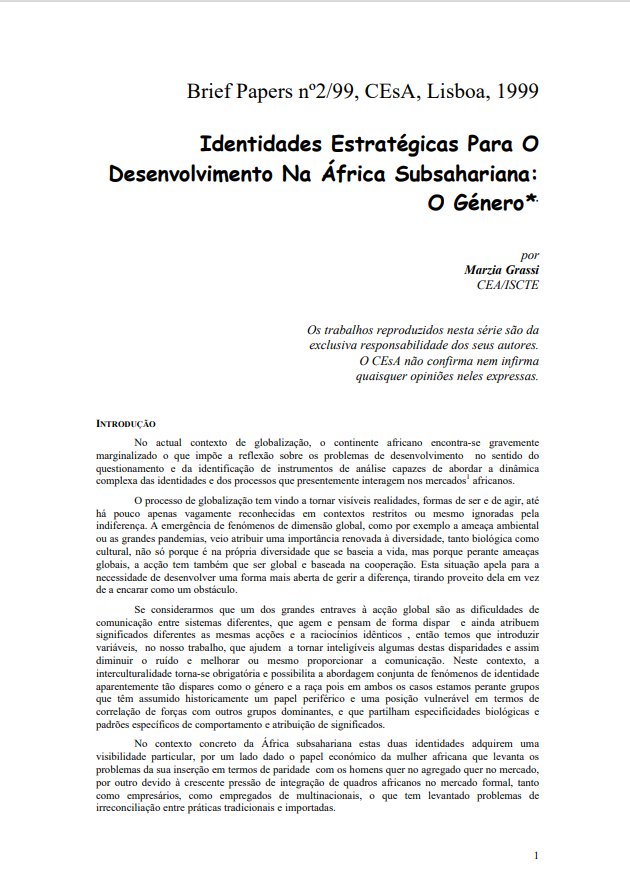
Brief Paper 3/1999: Identidades Estratégicas para o Desenvolvimento na África Subsahariana: O género
Abstract:
In the current context of globalisation, the African continent is seriously marginalised, which makes it necessary to reflect on development problems in order to question and identify analytical instruments capable of dealing with the complex dynamics of identities and processes that are currently interacting in African I-markets. The process of globalisation has made visible realities, ways of being and acting which until recently were only vaguely recognised in restricted contexts or even ignored through indifference. The emergence of phenomena with a global dimension, such as environmental threats or major pandemics, has given renewed importance to diversity, both biological and cultural, not only because diversity itself is the basis of life, but because in the face of global threats, action must also be global and based on cooperation. This situation calls for the need to develop a more open way of managing difference, taking advantage of it rather than seeing it as an obstacle. If we consider that one of the major barriers to global action are the difficulties of communication between different systems, which act and think differently and even assign different meanings to the same actions and identical reasoning, then we have to introduce variables in our work that help to make some of these disparities intelligible and thus reduce the noise and improve or even provide communication. In this context, interculturality becomes compulsory and enables a joint approach to identity phenomena apparently as disparate as gender and race, because in both cases we are dealing with groups that have historically assumed a peripheral role and a vulnerable position in terms of the correlation of forces with other dominant groups, sharing biological specificities and specific patterns of behaviour and meaning attribution. Identidades Estratégicas para o Desenvolvimento na África Subsahariana: O género (Strategic identities for development in Sub-Saharan Africa: gender) was presented at the 1st Portugal – China Congress organised by the University of Trás-os-Montes e Alto Douro in Vila Real, 19-23 April 1999.
Quotation:
Grassi, Marzia. 1999. “Identidades estratégicas para o desenvolvimento na África Subsahariana : o género”. Instituto Superior de Economia e Gestão – CEsA Brief papers nº 3-1999.
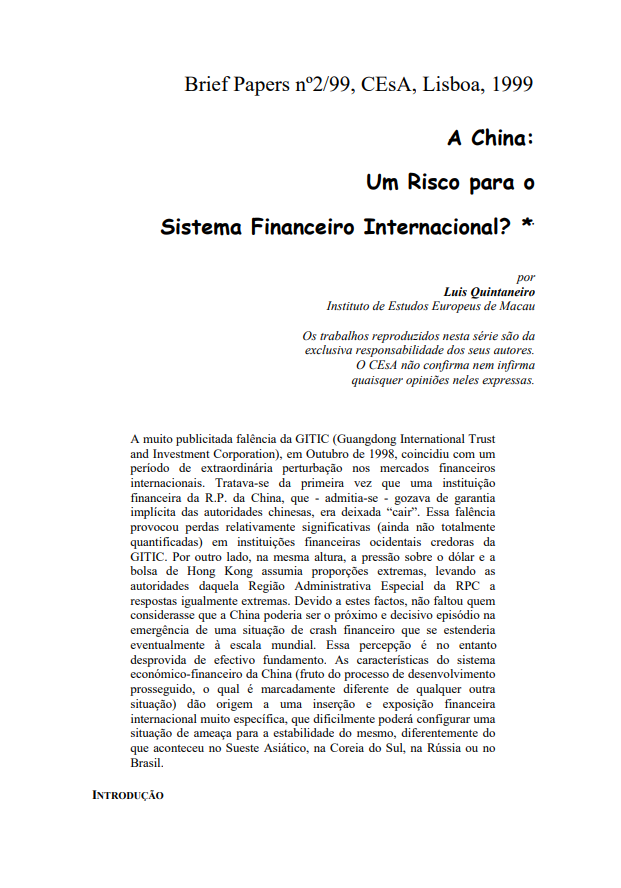
Brief Paper 2/1999: A China: Um risco para o sistema financeiro internacional?
Abstract:
The much publicized bankruptcy of G1T1C (Guangdong International Trust and Investment Corporation) in October 1998 coincided with a period of extraordinary turmoil in international financial markets. It was the first time that a financial institution in the R.P. of China, which – it was admitted – enjoyed an implicit guarantee from the Chinese authorities, was allowed to “fall”. This bankruptcy caused relatively significant losses (not yet fully quantified) in Western financial institutions creditors of GITIC. On the other hand, at the same time, the pressure on the dollar and the Hong Kong stock market was taking on extreme proportions, leading the authorities of that PRC Special Administrative Region to similarly extreme responses. Due to these facts, there was no lack of those who considered that China could be the next and decisive episode in the emergence of a situation of financial crash that would eventually extend to the world scale. This perception is, however, devoid of any real foundation. The characteristics of China’s economic and financial system (the result of the development process pursued, which is markedly different from any other situation) give rise to a very specific international financial insertion and exposure, which can hardly constitute a threat to stability of the same, unlike what happened in Southeast Asia, South Korea, Russia or Brazil. China: Um Risco para o Sistema Financeiro Internacional? was presented at the 1st Portugal – China Congress organised by the University of Trás-os-Montes e Alto Douro in Vila Real, 19-23 April 1999.
Quotation:
Quintaneiro, Luís. 1999. China: Um Risco para o Sistema Financeiro Internacional? Instituto Superior de Economia e Gestão – CEsA Brief papers nº 2-1999
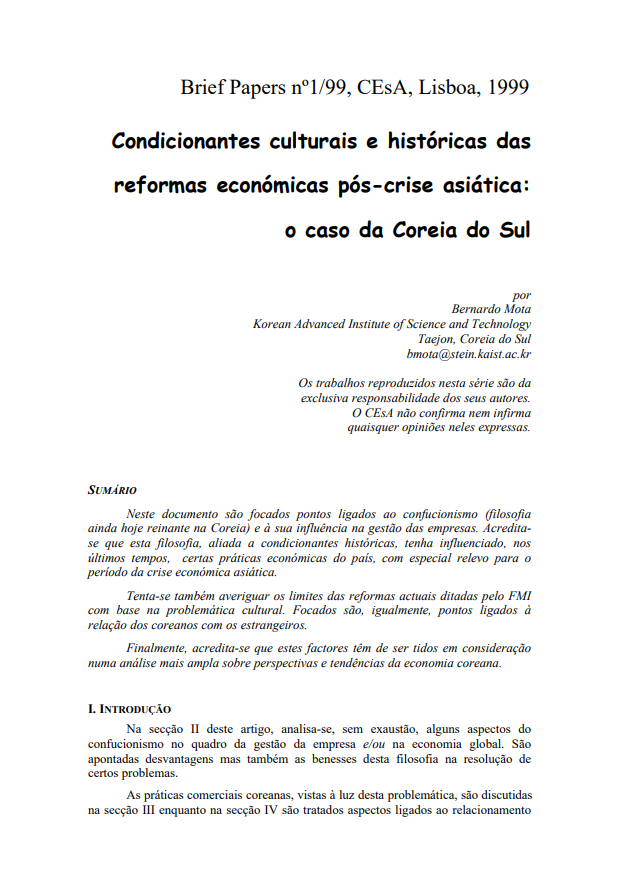
Brief Paper 1/1999: Condicionantes Culturais e Históricas das Reformas Económicas Pós-crise Asiática: O caso da Coreia do Sul
Abstract:
In Condicionantes Culturais e Históricas das Reformas Económicas Pós-crise Asiática: O caso da Coreia do Sul, we focus on Confucianism (a philosophy still prevailing in Korea) and its influence in the management of companies. It is believed that this philosophy, together with historical conditions, has influenced certain economic practices in the country in recent times, with special emphasis on the period of the Asian economic crisis. An attempt is also made to investigate the limits of the current reforms dictated by the IMF on the basis of cultural issues. It also focuses on the relationship between Koreans and foreigners. Finally, it is believed that these factors have to be taken into consideration in a broader analysis of prospects and trends in the Korean economy. It is believed that in an economic or financial analysis of the Korean (and Asian) crisis, its consequences and the outcome of reforms it is indispensable to take into account cultural and historical factors and social specificities. Confucianism is the most influential of these features. Some points of its influence on economic decision-making are reviewed. Certain Confucian features are believed to act as catalysts for economic recovery, and should not be completely dismissed as anachronistic. Korea could become a model of development, combining, in an original way, such divine variables as Confucianism, globalisation and economic liberalisation, on condition that a certain rigour in administration is introduced. Finally, I am convinced that a Confucian society is not incompatible with economic and democratic development in an increasingly global environment.
Quotation:
Mota, Bernardo. 1999. “Condicionantes culturais e históricas das reformas económicas pós-crise asiática : o caso da Coreia do Sul”. Instituto Superior de Economia e Gestão – CEsA Brief papers nº 1-1999
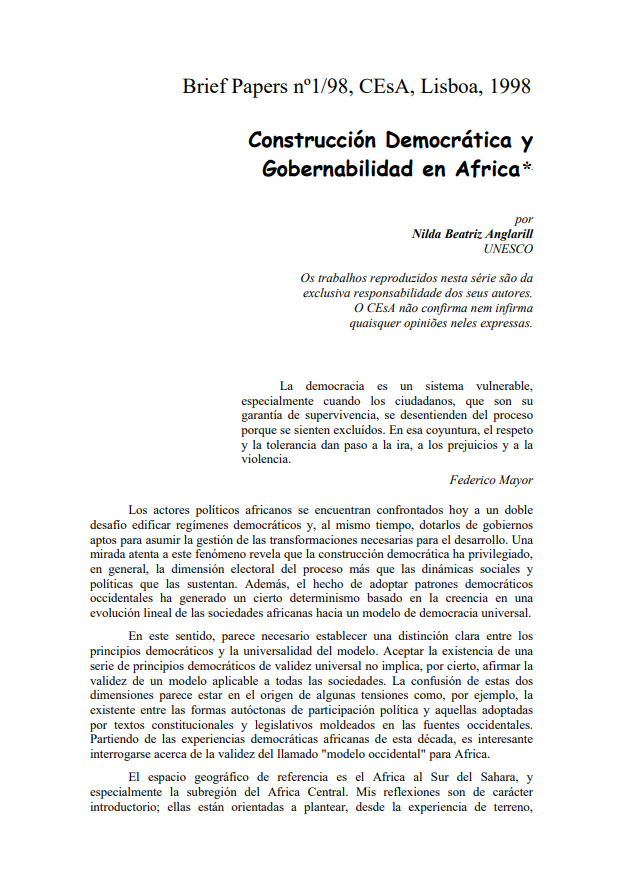
Brief Paper 1/1998: Construccíón Democrática y Gobernabilidad en Africa
Abstract:
African political players are today faced with a double challenge: building democratic regimes and, at the same time, equipping them with governments capable of managing the transformations necessary for development. A close look at this phenomenon reveals that democracy building has generally privileged the electoral dimension of the process rather than the underlying social and political dynamics. Moreover, the adoption of Western democratic standards has generated a certain determinism based on the belief in a linear evolution of African societies towards a model of universal democracy. In this sense, it seems necessary to make a clear distinction between democratic principles and the universality of the model. Accepting the existence of a series of democratic principles of unequivocal validity does not, of course, imply the affirmation of the validity of a model applicable to all societies. Confusion between these two dimensions seems to be at the root of certain tensions, such as that between indigenous forms of political participation and those adopted by constitutional and legislative texts based on Western sources. On the basis of the African democratic experiences of this decade, it is interesting to question the validity of the so-called “Western model” for Africa. Communication at the CESA 1997 Seminar: The Problematic of Development – History and a Transdiciplinary Perspective, Conference Construção Democrática e Contributos Actuais numa Governance em África (Democratic Construction and Current Contributions to Governance in Africa), 23 May 1997.
Quotation:
Comunicação no Seminário CEsA 1997: A Problemática do Desenvolvimento – Historicidade e Contributos Actuais numa Óptica Transdiciplinar, Conferência “Construção Democrática e ‘Governance’ em África”, 23 de Maio de 1997.





